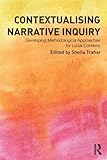Contextualising narrative inquiry : developing methodological approaches for local contexts / edited by Sheila Trahar.
Material type: TextPublication details: New York, N.Y. : Routledge, c2013.Description: xxi, 200 p. : ill. ; 23 cmISBN:
TextPublication details: New York, N.Y. : Routledge, c2013.Description: xxi, 200 p. : ill. ; 23 cmISBN: - 9780815349341 (paperback)
- 001.42 CON 23
| Item type | Current library | Collection | Call number | Status | Date due | Barcode | |
|---|---|---|---|---|---|---|---|
 Books
Books
|
H.T. Parekh Library | SIAS Collection | 001.42 CON (Browse shelf(Opens below)) | Available | K3623 |
Rs.895/-
TBH86/52
"Narrative inquiry is growing in popularity as a research methodology in the social sciences, medicine and the humanities. In narrative inquiry, the transparency of interactions between researcher and research participants, together with rich, contextual descriptions, help to shape and structure research texts rendering them engaging and readable. Contextualising Narrative Inquiry argues that all researchers should foreground the importance of the context in which research takes place and develop methodological approaches that are grounded in their local contexts. To do so, they need to pay attention to how knowledge is constructed, shared and understood in those contexts. This is particularly important when contexts have been subjugated historically through colonialism and when local, indigenous ways of knowing have been ignored or dismissed. The contributors to this edited collection have all used narrative inquiry for a range of topics and in a range of contexts, including: Leadership styles of Asian women The Deaf community in the UK Voluntary celibacy in Malta Administrators in Ghanaian higher education Multiculturalism in primary education in Cyprus Teacher identities in Hong Kong The reflective practitioner in higher education in Malaysia. The diversity of the topics illuminates the potential for narrative inquiry to be used to investigate a broad range of issues in many contexts by people with a wide range of backgrounds. A common thread throughout is a reflexive discussion of how each contributor used narrative inquiry as a methodological approach; highlighting not only its affordances, but also the complexities of using it in specific cultural, social and historical contexts"-- Provided by publisher.
"Narrative inquiry is growing in popularity as a research methodology in the social sciences, medicine and the humanities. One of narrative inquiry's great strengths is that it enables readers to transparently examine how interactions between researcher and research participants help to shape and structure research texts rendering them engaging and readable. Contextualising Narrative Inquiry foregrounds the importance of the context in which research takes place and critiques the dominant discourses that inform narrative inquiry so that they are not applied unquestioningly, particularly in contexts that do not necessarily privilege those discourses. It argues that all researchers should develop methodological approaches that are grounded in local contexts and that pay attention to how knowledge is shared and understood in those contexts. This becomes even more important when those local contexts have historically been subjugated through colonialism and when local, indigenous ways of knowing have been ignored or dismissed as worthless. The contributors to this edited collection have all used narrative inquiry in their research into a range of topics and in a range of contexts"-- Provided by publisher.
There are no comments on this title.


